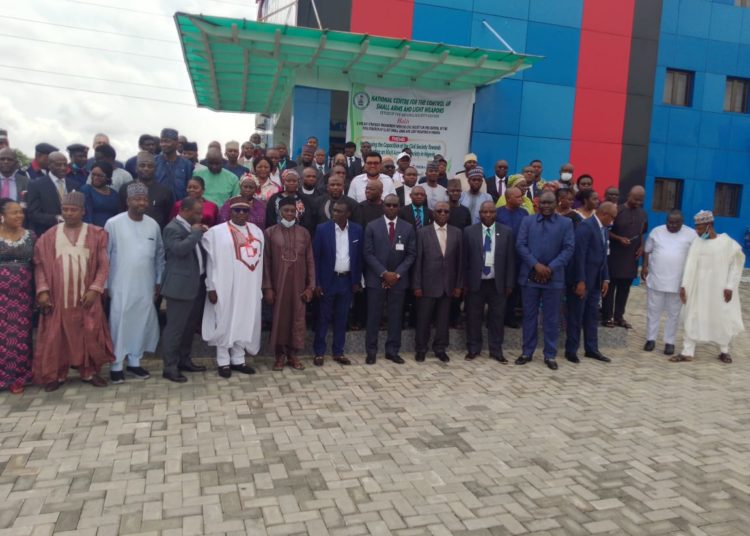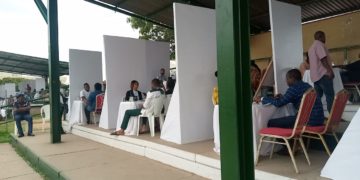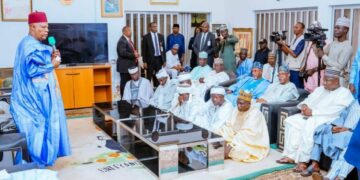Following the spread of gun violence across the country, the the National Centre for the Control of Small Arms and Light Weapons (NCCSALW) has parleyed civil society organisations (CSOs) on the need to curb the circulation of small arms and light weapons.
The National Security Adviser, Major General Babagana Monguno (rtd), in his address at a one-day strategic engagement with civil society organisations organised by the National Centre for the Control of Small Arms and Light Weapons with the theme, “Harnessing the Capacities of the Civil Society towards promoting an Illicit Arms-free Society in Nigeria,” lamented that despite efforts, the global community was losing the war against transnational organised crimes, terrorist groups and trafficking of small arms and light weapons (SALW).
Monguno, who was represented by his Special Assistant On Special Duties, Ambassador Ahmed Mohammed, said illicit small arms and light weapons have continued to undermine global peace and significantly hinder development.
“Despite our best efforts, it has become apparent that West Africa, and indeed the global community, are losing the war to transnational organized criminal networks, terrorist groups, domestic criminal elements and weapons manufacturers who for various motives, choose to act outside the norms and dictates of all extant national laws and international protocols and conventions as they continue to keep the security space awash with illicit SALW.
“This we must not allow to continue. I am particularly delighted that the Centre has established the Zonal Offices which without doubt will drive our national effort closer to the people.
“We are gathered here today as partners, driven by a shared vision for peace and security in Nigeria and the region. We have gathered because the impact of unbridled proliferation of SALW in Nigeria is of grave concern to every citizen or organization that is represented here,” the NSA said.
He said the proliferation of SALW in many regions of the world and particularly West Africa, has been a matter of grave concern to countries and regional organisations alike.
“It has become a major source of insecurity in our society as it fuels violent conflict, crime and terrorism.
“Nonetheless, while the threat and the use of SALW have been directly responsible for much of the untold human suffering in our society, it is important to emphasize that these weapons themselves do not cause conflict. Rather, it is the easy access to them and the simplicity of their use that make violence more lethal and conflict more protracted,” he added.
The National Security Adviser said small and light weapons have become weapons of choice for criminals, terrorists and bandits in Nigeria and beyond, posing a significant challenge to the country especially in the wake of insecurity that has recently engulfed the Sahel Region.
“Hence the need to stop the proliferation of these deadly weapons,” he stressed.
He added that it was against the backdrop of the proliferation of weapons and its attendant consequences that President Muhammadu Buhari authorised the establishment of the National Centre for the Control of SALW “to serve as the institutional platform to stem the proliferation of small arms within the framework of the various international protocols and instruments to which Nigeria is committed. By this action, the President has further demonstrated Nigeria’s commitment to the provisions of Article 24 of the ECOWAS Convention on SALW which requires each member state to establish national institutions to promote a multilateral approach to stamping out illicit arms trade in the Sub-region.
“The efforts towards eradicating illicit arms globally is one that has involved all stakeholders including the international and regional community, nations, states and most importantly, the Civil Society.”
Earlier in his welcome remarks, the National Coordinator, NCCSALW, Major General Abba Mohammed Dikko (rtd), said the Centre has made giant strides within the short timeframe to achieve full operationalisation.
He restated that the proliferation of SALW has negatively impacted peace, security and socio-economic wellbeing of Nigeria, adding that it has remained a key driver for terrorism, ethno-religious conflicts, violent separatism and sundry organised criminal activities within and across the nation’s borders.
He said Nigeria has borne the brunt of the instability in the Sahel region occasioned by the push-and-pull effect of arms trafficking.
“Consequently, Nigeria has closed ranks with her neighbours, ECOWAS and other international stakeholders over the years to eradicate illicit SALW in the hands of unauthorized persons or at least, halt their proliferation. Even though the progress made in this area has remained a subject of debate, Nigeria has continued to tackle the challenge head-on,” he said.
The coordinator said the Centre has focused, since its establishment, on discharging its core function of providing a strategic platform for arms control in Nigeria through close partnership with stakeholders especially the CSOs, both locally and internationally.





